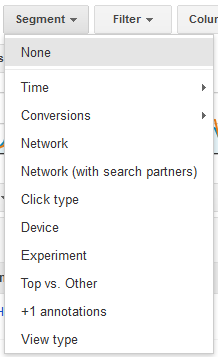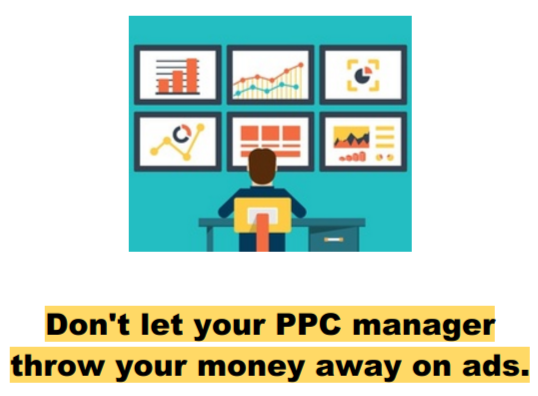|
I've written before about a couple mistakes to avoid when working with a Pay Per Click (PPC) agency / manager. This article especially noted that: 1) PPC managers are usually financially incentivized (by their contract with you) to spend more. And while they do want to keep you as a client (incentive to get a good return on your investment), often they can do so without maximizing your results (incentive to spend more and make more). So I gave some ideas on managing this. (When I run PPC for someone, I may suggest an alternative to % based payment in order to encourage better spend AND expansion testing while helping with budgeting.) 2) Keywords for your brand should be expected to get different results (usually a much higher click through rate and return on investment), so you should make sure your PPC company manages them in a separate campaign. This can let you set different return on investment standards for all other keywords.  Today I wanted to point out a couple other important ways to manage your PPC manager: 1) Make sure they're making good use of negative keywords. You don't have to know how this is done, but in your regular review of your account, ask to see the search terms that are driving traffic. If you're a barber, you may be bidding on the keyword "haircut" and you want to show up for searches like "where can I get a haircut" (and your ads should be limited to showing up for people in the area you serve). But you don't want to show up when someone searches for "how can I give a haircut," because this isn't the audience you want to pay for. Your PPC manager should be including "how to give" and "how can I give" as negative keywords, along with any other terms you see that aren't appropriate for your ads. Don't have them show this in a report; have them show you in your actual account so that nothing's being left out. 2) Make sure they're testing different ads for high-volume groups. Truly valuable A/B testing is actually tough to do because it involves a lot of volume to be statistically valid. And if that volume takes too long to occur, then things like seasonality, competition, and changing needs / desires can alter how and why people click on ads. But if you have a lot of volume for certain ads, make sure variations are tested against one another so you can attract more visitors. 3) Consider adding prices to text ads. Contrary to the former point (going for a high click through rate, or CTR), adding prices to ads may purposely dissuade certain people from clicking. That's a good thing. It helps to pre-qualify your visitors. You don't want to pay for visits from people who won't buy at your price point. This may lower CTR while increasing your conversion rate and ROI (or ROAS - return on ad spend). It's not reasonable to expect a PPC manager to continually change prices in ads. But if prices change on occasion, I believe they should be willing because it can help you to spend more efficiently. However, it is then YOUR responsibility to communicate all price changes. You may also choose to just do this for your most popular products or services. 4) See if they need to adjust for your business schedule. You may choose to take in account orders that come in by phone when setting your bids. Sometimes these can be tracked, but not always, so your ROI or ROAS may look worse than it really is when your call center is operating. But if you do this, make sure your bids are being reduced after hours. You campaigns can be set up to do this automatically. Likewise, your business might do better or worse on weekends depending on your audience and what you sell. Again, make sure bids are adjusted accordingly. These adjustments can be broken down by day or even to the specific hour, so pre-business, during business, and post-business hours so you can see when conversions are taking place and adjust accordingly. 5) See if they need to adjust by device type. You can have them break down any campaigns results by desktop, tablet, and mobile device to see where your clicks are coming from and where you get your conversions. Be careful on this: people often move between devices before making a purchase, and sometimes use mobile phones (for example) to do research before making a purchase on a desktop. But be aware that you can make decisions from this data. 6) If you're running Shopping Ads, make sure bids are being adjusted on individual SKUs. Shopping ads are those ads with product pictures and prices automatically in the ad, often at the top of search results for products (not services). They are based on a feed provided by your company. These are run differently than text ads -- your PPC manager does not get to choose the keywords that your products show up for. However, they can and should still be using negative keywords and should break the feed out to individual product SKUs, at least for higher volume products. They can then get more or less aggressive bidding on that product, depending on how well it's converting over time. Conclusion A good PPC manager knows all of this and the question often boils down to care and attention to detail. If they want your business long term, they should care, and should be happy to have you ask questions about any of this. If you're concerned that you're not getting transparency from your PPC company, I would be happy to review your Adwords and Bing Ads accounts. You will simply need to provide me with a user name and password to look at them and then review them with you through a screen sharing session. (You can change your password after our review.) You can contact me here about this. Please note that I don't take on many client accounts, so I'm not in the business of shooting down other PPC managers -- I will be delighted to tell you that your manager's doing a great job and to leave you with a few questions to pursue with them. But if we find that your account is being badly managed, I'd also be happy to talk about running your account whenever your current contract is up. But no obligation -- I'd just love to know that I helped you improve your company's ventures online.
0 Comments
|
Archives
May 2018
|

 RSS Feed
RSS Feed
